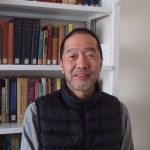From the Dean of the Faculty

“Where did we come from, and where are we headed?”, “How have humans lived, and with what purpose?”, “How is the society organized, and how is it maintained?”, “What is love, what is virtue, what is beauty… In what manner have people philosophized about and expressed these?”, “What is the intrinsic nature of language that we humans manipulate?”
At the Faculty of Humanities, these are the themes we debate everyday. Some say that humanities is a sort of hobby; a vocation of no real value that should be left to people of leisure. And it is still fresh in our memories that people have claimed humanities to be an unnecessary field of study at a national university. Can that really be true?
Certainly, the state-of-the-art science and technology have brought many benefits to our lives, and economics and legal studies have contributed greatly to modern social analysis and problem-solving. On the other hand, while humanities pursues the fundamental questions related to human beings, it is not a field that leads directly to immediate benefits.
However, when we ask ourselves questions like “Does this state-of-the-art science and newest theory which symbolize modern civilization truly contribute to mankind? Is the happiness of mankind guaranteed if we pursue them? Are the culled and rejected old technologies and theories really obsolete?”, we cannot help but go back to the old but somehow still new question of “What are human beings, and how should we live our lives?”.
What is required of us is to develop the capacity to see into ourselves, rather than looking at others, and to not accept ourselves as holy writ, but instead grasp the moment as a phase between the past and future, and realize that it is coexistence with our neighbors that makes our lives feasible; in other words, we must always look within ourselves and reflect humbly on our imperfections and immaturity.
However, attaining an eye that can see into ourselves is, in fact, extremely difficult. The ancient Chinese thinker, Han Fezi, uses the analogy that it isn’t easy for one to see their own eyebrows however good their eyesight to explain that “The difficulty in acquiring knowledge lies not in seeing others, but in seeing oneself.”
What we want to emphasize here is that in the field of humanities where the fundamental skepticism of mankind is pursued, the ability to elucidate those questions and find solutions depends on how the student uses their own strength to think about and land upon them after digesting and taking in the wisdom and experience of our predecessors to the fullest extent. Hence this is why we must constantly look back on ourselves, question ourselves, and strive to perceive our true nature; in a sense we must be engaged in constant internal dialog with ourselves.
Humanities is the field of study through which we develop the eye to see into ourselves, and is the field most needed by modern society. Every field of study must have its ultimate roots in humanities for it to become a genuine field of study.
By studying humanities, you can acquire the eye to see both yourself and the world from a philosophical perspective. This eye will help you acquire a profound intelligence and a rich human nature, and give you the strength to live through the present and future. This doesn’t apply only to those who wish to join the Faculty of Humanities. If you have decided to study in other faculties or on science courses, you should have confidence in your decision, and at the same time, recognize the importance of having the eye to see into yourself, and take any opportunity that arises to seriously study humanities.
Wakijo Yasuhiro, Dean of the Faculty of Humanities

